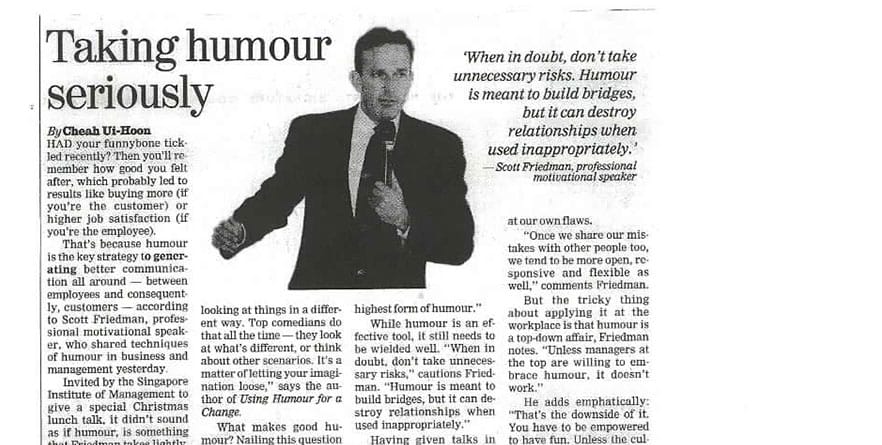
The Business Times, 13 Dec 2002
Had your funnybone tickled recently? Then you’ll remember how good you felt after, which probably led to results like buying more (if you’re the customer) or higher job satisfaction (if you’re the employee).
That’s because humour is the key strategy to generating better communication all around – between employees and consequently, customers – according to Scott Friedman, professional motivational speaker, who shared techniques of humour in business and management yesterday.
Invited by the Singapore Institute of Management to give a special Christmas lunch talk, it didn’t sound as if humour, is something that Friedman takes lightly.
“In these times of stress, humour hasn’t been more important, but it’s also more delicate than ever,” he notes, explaining how important humour is to the workplace.
Humour isn’t this unattainable goal however, Friedman says encouragingly. The trick is to find it in everyday life. “It’s looking at things in a different way. Top comedians do that all the time – they look at what’s different, or think about other scenarios. It’s a matter of letting your imagination loose,” says the author of Using Humour for a Change.
What makes good humour? Nailing this question is a tricky one. To some of us, it’s like our body shapes, you inherit the quality. But most experts in humour will tell you that it’s a skill that everyone has to hone. Even if you’re a natural comedian. To the uninitiated, Friedman advises: “The safest bet is always to use self-effacing humour. To be able to poke fun at yourself is the highest form of yourself.”
While humour is an effective tool, it still needs to be wielded well. “When in doubt, don’t take unnecessary risks.” cautions Friedman.”Humour is meant to build bridges, but it can destroy relationships when used inappropriately.”
Having given talks in Singapore for the past five years, Friedman observes that Singaporeans would do well to learn to laugh at themselves. “From what I can see, it’s a fairly formal society here. But as humans, we all make mistakes. It’s being able to embrace those mistakes and learn from them that gives us permission to laugh at our flaws.
“Once we share our mistakes with other people too, we tend to be more open, responsive and flexible as well,” comments Friedman.
But the tricky thing about applying it at the workplace is that humour is a top-down affair, Friedman notes. “Unless managers at the top are willing to embrace humour, it doesn’t work.”
He adds emphatically: “That’s the downside of it. You have to be empowered to have fun. Unless the culture is one that promotes openness and a sense of trust and the permission to play, then it won’t work,” he says. “Because attitude flows downhill.”
If top management were to embrace humour in the workplace, then there would be happier workers, and in turn, happier customers.


